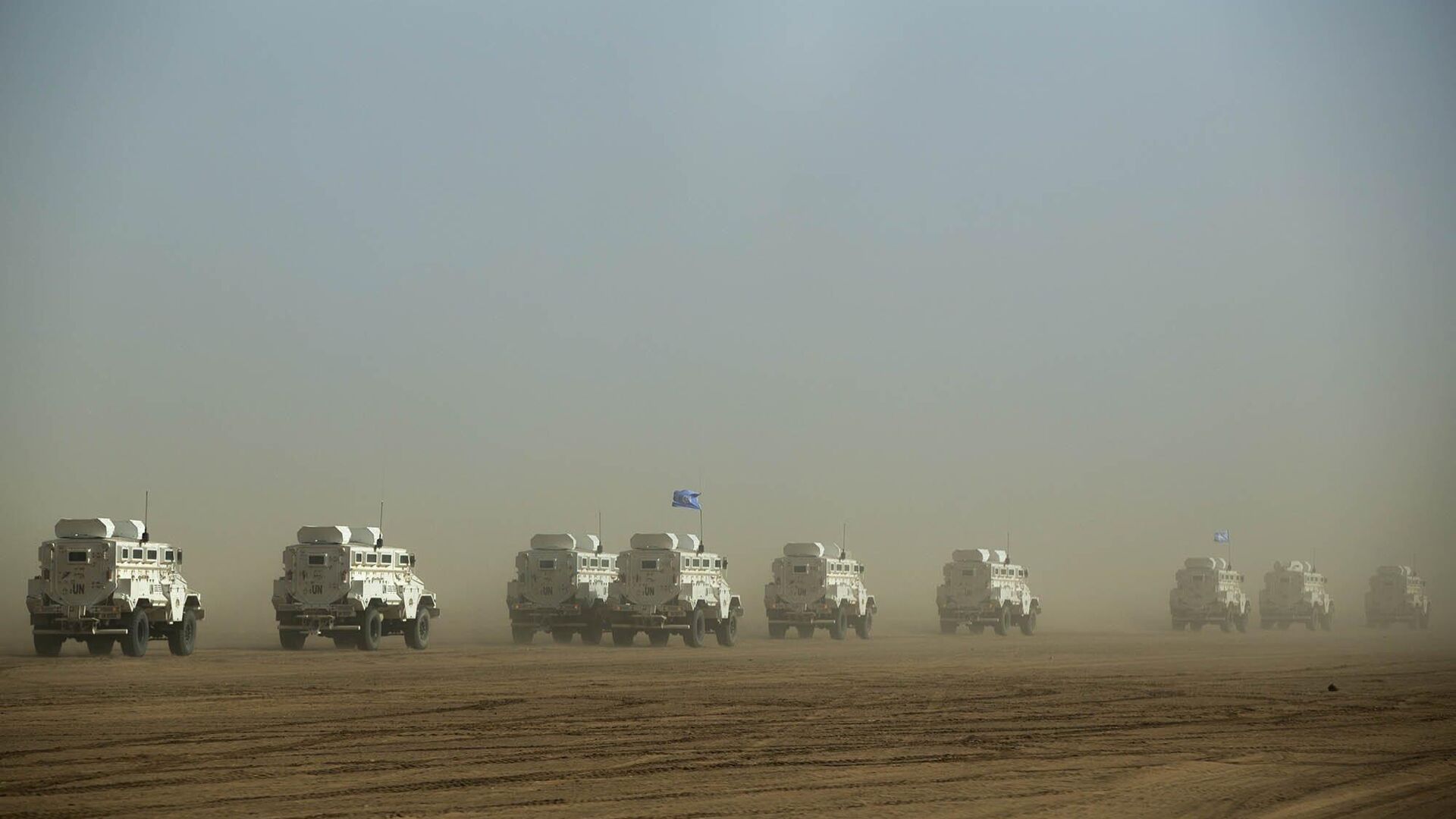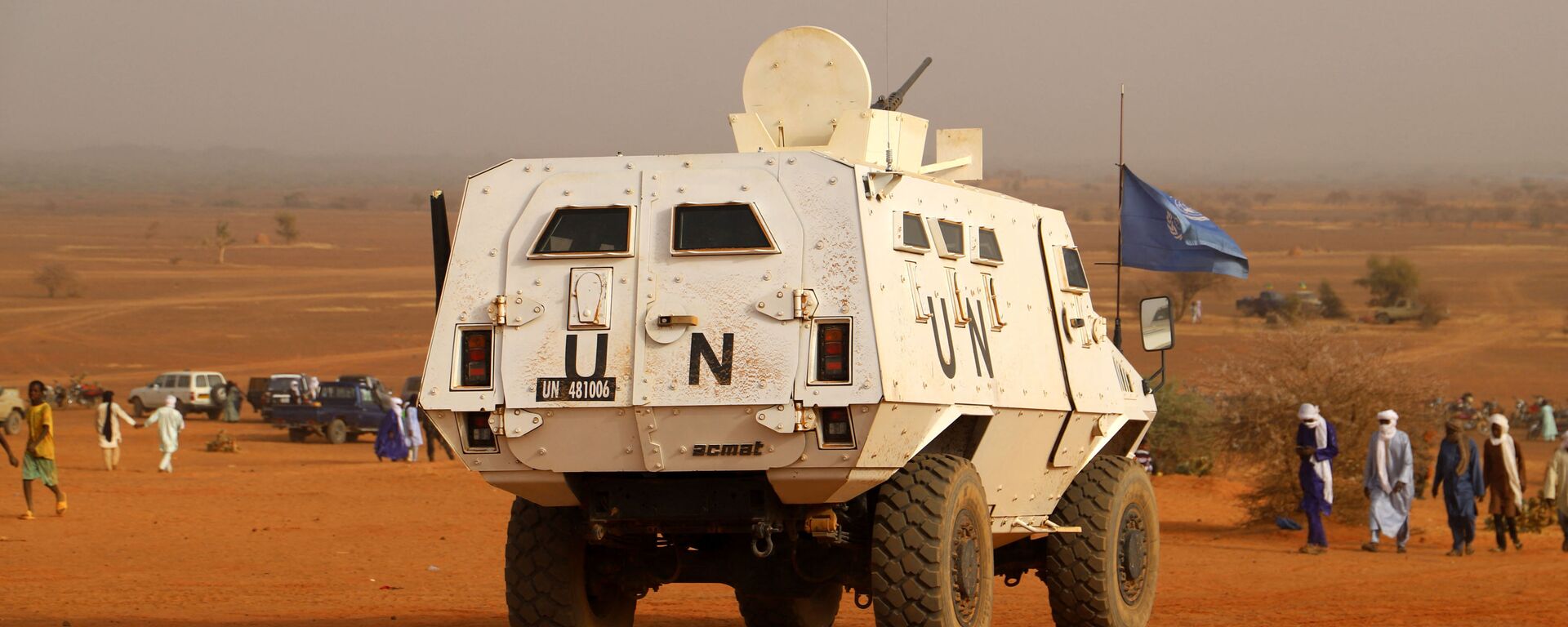https://en.sputniknews.africa/20230829/peacekeepers-in-mali-face-challenging-next-phase-of-withdrawal-minusma-head-1061719939.html
Peacekeepers in Mali Face Challenging Next Phase of Withdrawal: MINUSMA Head
Peacekeepers in Mali Face Challenging Next Phase of Withdrawal: MINUSMA Head
Sputnik Africa
Earlier this month, the United Nations Under-Secretary-General for Peace Operations, Jean-Pierre Lacroix, arrived in Mali for a two-day working visit to meet... 29.08.2023, Sputnik Africa
2023-08-29T18:23+0200
2023-08-29T18:23+0200
2023-08-29T18:35+0200
sub-saharan africa
west africa
mali
united nations multidimensional integrated stabilization mission in mali (minusma)
united nations (un)
united nations security council (unsc)
security
military
https://cdn1.img.sputniknews.africa/img/07e7/08/1d/1061720712_0:104:2000:1229_1920x0_80_0_0_831b02a6afe407f76c87dbcfbda4b232.jpg
The head of the United Nations mission in Mali, El-Ghassim Wane, told members of the Security Council on Monday that winding down the mission in six months after 10 years of presence is a "complex and ambitious" undertaking. He noted that the second phase of the pullout will be even more challenging due to a tight timeline and dangerous security conditions.Wane, who is also the Special Representative of the Secretary-General for Mali, presented to the Security Council the first progress report on MINUSMA's withdrawal from the country. Two phases of the pullout process, the first of which has been underway since July, were outlined in the Security Council resolution of June 30, which terminated the mandate of MINUSMA. The first phase involved closing down MINUSMA's small posts and camps located in remote areas, including those in Timbuktu, Gao and Mopti.In early August, the temporary base at Ogossagou in the Bandiagara region of central Mali and the Ber and Goundam camps in the Timbuktu region were closed. On August 25, this phase was completed with the closure of the Menaka base.According to Wane, significant progress has been made so far and the UN remains on track to close the mission by December 31, but certain "difficulties have arisen in the implementation of this first phase of the withdrawal plan."In particular, he pointed to the difficulties encountered during the closure of MINUSMA's Ber camp, including a 51-hour journey to Timbuktu through difficult terrain, exacerbated by rain and insecurity.About 1,100 of the UN's "blue helmet" peacekeepers have returned to their countries, he said. By September 30, about one-third of the civilian staff of MINUSMA will have been withdrawn.Wane noted that the next phase also presents serious logistical and security challenges as it includes covering distances of up to 563 kilometers and managing more than 1,050 truckloads of equipment, while facing the threat of ambushes and improvised explosive devices.On June 30, the Security Council decided to terminate the mandate of MINUSMA in accordance with the request of the Malian authorities, which demanded that the closure be completed by December 31, 2023.By December, the mission's 12 camps and one temporary operating base are required to be closed and handed over to transitional authorities, while its uniformed personnel numbering about 13,000 to be repatriated. Civilian personnel will also be withdrawn, while equipment, some 5,500 sea containers and 4,000 vehicles, will be transferred to other missions or repatriated to the contributing countries.
https://en.sputniknews.africa/20230828/un-mission-in-mali-must-adhere-to-strict-withdrawal-timeline-russian-envoy-to-un-says-1061697871.html
west africa
mali
Sputnik Africa
feedback@sputniknews.com
+74956456601
MIA „Rossiya Segodnya“
2023
News
en_EN
Sputnik Africa
feedback@sputniknews.com
+74956456601
MIA „Rossiya Segodnya“
Sputnik Africa
feedback@sputniknews.com
+74956456601
MIA „Rossiya Segodnya“
west africa, mali, united nations multidimensional integrated stabilization mission in mali (minusma), united nations (un), united nations security council (unsc), security, military
west africa, mali, united nations multidimensional integrated stabilization mission in mali (minusma), united nations (un), united nations security council (unsc), security, military
Peacekeepers in Mali Face Challenging Next Phase of Withdrawal: MINUSMA Head
18:23 29.08.2023 (Updated: 18:35 29.08.2023) Earlier this month, the United Nations Under-Secretary-General for Peace Operations, Jean-Pierre Lacroix, arrived in Mali for a two-day working visit to meet with the country's authorities and UN personnel to discuss "the safe and responsible withdrawal" of the organization's peacekeeping mission in the West African nation.
The head of the United Nations mission in Mali, El-Ghassim Wane, told members of the Security Council on Monday that winding down the mission in six months after 10 years of presence is a "complex and ambitious" undertaking. He noted that the second phase of the pullout will be even more challenging due to a tight timeline and dangerous security conditions.
Wane, who is also the Special Representative of the Secretary-General for Mali, presented to the Security Council the first progress report on MINUSMA's withdrawal from the country.
Two phases of the pullout process, the first of which has been underway since July, were outlined in the Security Council resolution of June 30, which terminated the mandate of MINUSMA. The first phase involved closing down MINUSMA's small posts and camps located in remote areas, including those in Timbuktu, Gao and Mopti.
In early August, the temporary base at Ogossagou in the Bandiagara region of central Mali and the Ber and Goundam camps in the Timbuktu region were closed. On August 25, this phase was completed with the closure of the Menaka base.
According to Wane, significant progress has been made so far and the UN
remains on track to close the mission by December 31, but certain "difficulties have arisen in the implementation of this first phase of the withdrawal plan."
In particular, he pointed to the difficulties encountered during the closure of MINUSMA's Ber camp, including a 51-hour journey to Timbuktu through difficult terrain, exacerbated by rain and insecurity.
"The convoy was attacked twice by unidentified extremist elements, injuring four peacekeepers and damaging three vehicles," he said, adding that the withdrawal operations in other areas were also targeted.
About 1,100 of the UN's "blue helmet" peacekeepers have returned to their countries, he said. By September 30, about one-third of the civilian staff of MINUSMA will have been withdrawn.
The second phase of the process, which is now underway, will last until December 15. It will focus on the closure of six bases in northern, northeastern and central Mali. Personnel, equipment and supplies will be redeployed to camps in Timbuktu, Gao and Bamako before being repatriated to their respective countries.
Wane noted that the next phase also presents serious logistical and security
challenges as it includes covering distances of up to 563 kilometers and managing more than 1,050 truckloads of equipment, while facing the threat of ambushes and improvised explosive devices.
"This phase will be incredibly difficult indeed [...]. At least 1,050 trucks will be needed to transport all the equipment and materials belonging to the contingents and those belonging to the United Nations. The terrain is difficult and insecurity is an ever present threat," he said.
On June 30, the Security Council decided to terminate the mandate of MINUSMA in accordance with the request of the Malian authorities, which demanded that the closure be
completed by December 31, 2023.
By December, the mission's 12 camps and one temporary operating base are required to be closed and handed over to transitional authorities, while its uniformed personnel numbering about 13,000 to be repatriated. Civilian personnel will also be withdrawn, while equipment, some 5,500 sea containers and 4,000 vehicles, will be transferred to other missions or repatriated to the contributing countries.


